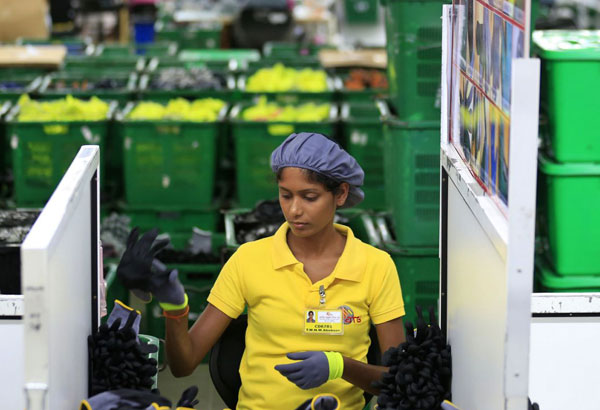EU restores preferential tax concessions to Sri Lanka

A Sri Lankan woman works at a glove making factory in country's largest export processing zone in Katunayaka, outskirts of Colombo, Sri Lanka, Tuesday, May 16, 2017. The European Union announced Tuesday it is restoring a preferential tax concession for goods imported from Sri Lanka that it withdrew seven years ago over alleged human rights abuses. (AP Photo/Eranga Jayawardena)
COLOMBO — The European Union announced yesterday it is restoring a preferential tax concession for goods imported from Sri Lanka that it withdrew seven years ago over alleged human rights abuses.
Tung-Lai Margue, ambassador to the delegation of EU to Sri Lanka told reporters that the change would take effect on Friday. He said the tax concession, known as the Generalized System of Preferences, is being restored as an incentive to make further progress on human rights. It also recognizes efforts the government has made so far, though some issues remain.
The ambassador said torture and the prevalence of a draconian anti-terror law are among problems needing attention and the EU will monitor Sri Lanka's progress.
"It is true that the government, in order to get GSP plus has made a lot of effort. But it may not be enough," Margue said. "It's not that we are complacent, that we find everything marvelous..."
Sri Lanka's military has been long accused of serious human rights violations, especially during a decades-long civil war with separatist ethnic Tamil rebels. The fighting ended in 2009 but there are continued allegations against the government military and police of using torture.
"It's clear that there is an ongoing problem," said Paul Godfrey the EU missions head of the mission's political, trade and communications section of allegations of torture against the Sri Lankan government.
"But it is important to recognize that this government is the first government to recognize that there was a serious problem with the issue. The first step in addressing a problem is to recognize that you do actually have a problem. I think these are very important signs," he said.
The EU withdrew the GSP facility in 2010 when the previous Sri Lankan government refused to investigate human rights abuses. The loss of the trade advantage was a blow to the economy, causing the loss of thousands of jobs especially in the garment sector.
The EU is Sri Lanka's largest export market and last year, exports from the island nation to the EU were valued at 2.6 billion euro ($2.87 billion). The EU says the removal of the tariffs will give Sri Lanka an immediate benefit of at least 300 million euros ($3.31 million) a year and encourage the country to diversify its exports to reap maximum benefits.
The concessions can be used until Sri Lanka achieves the status of an "upper middle income country" for three consecutive years. Trends show Sri Lanka would likely benefit from from them until at least 2021, the EU says.
- Latest
- Trending


































